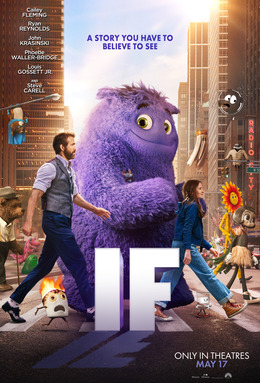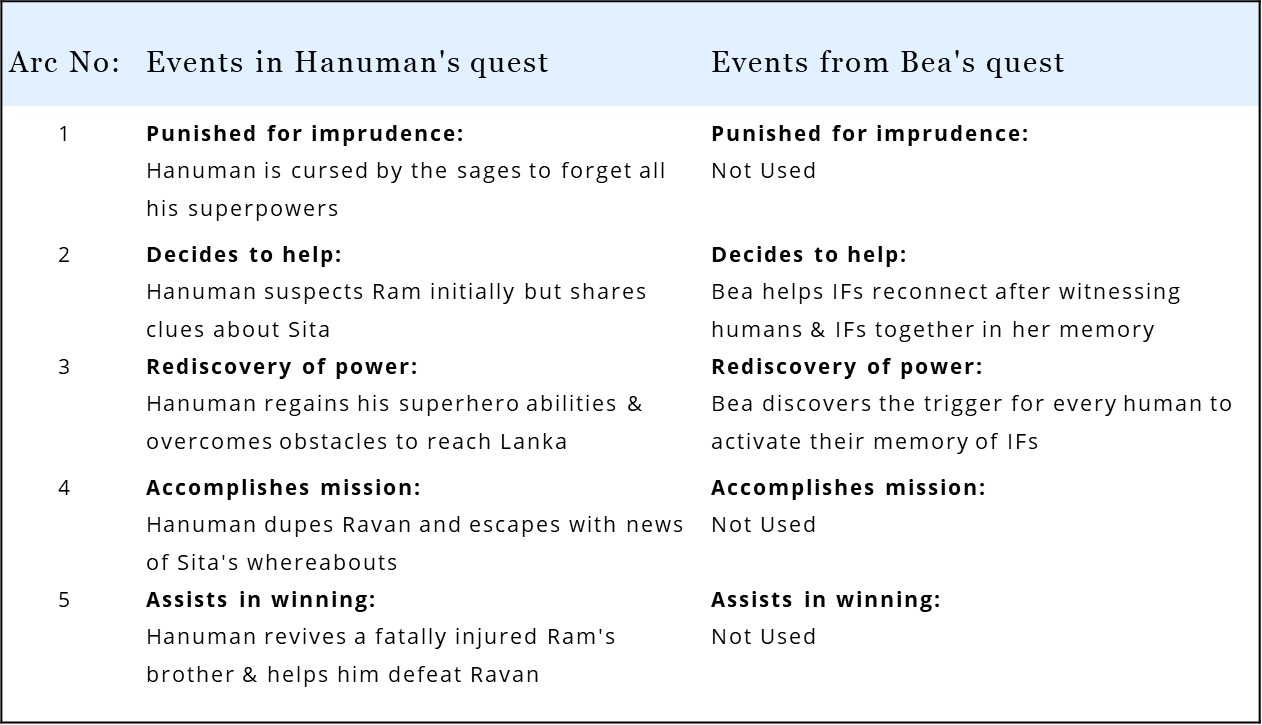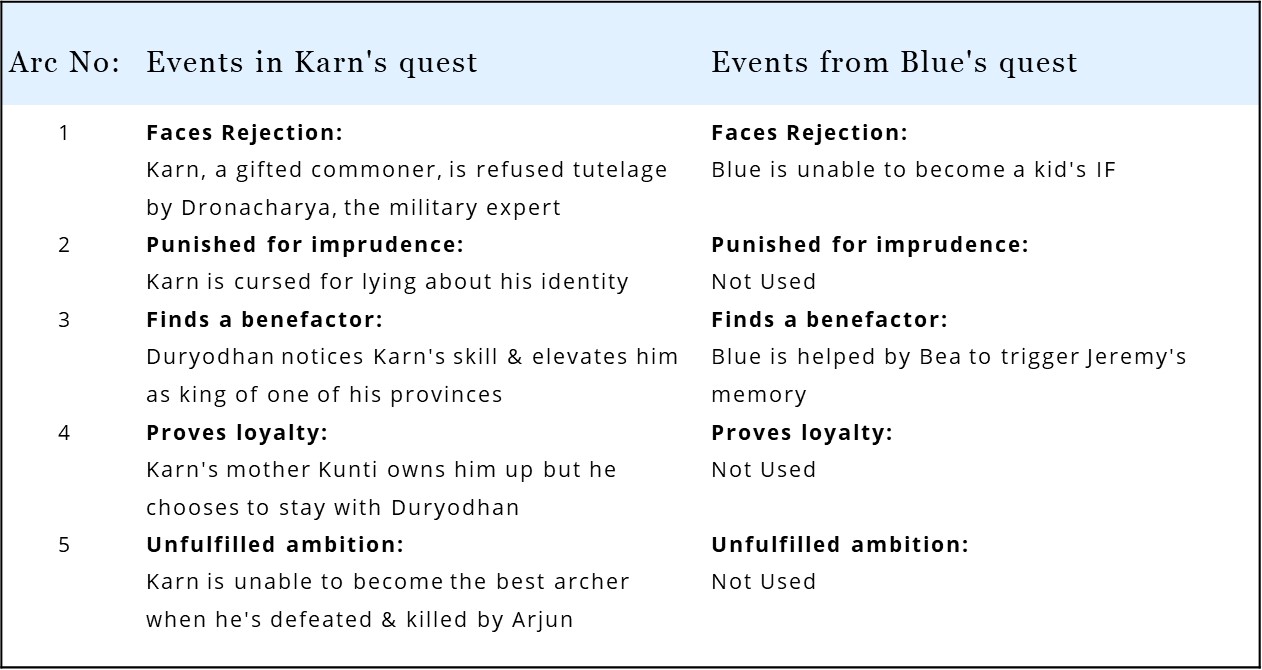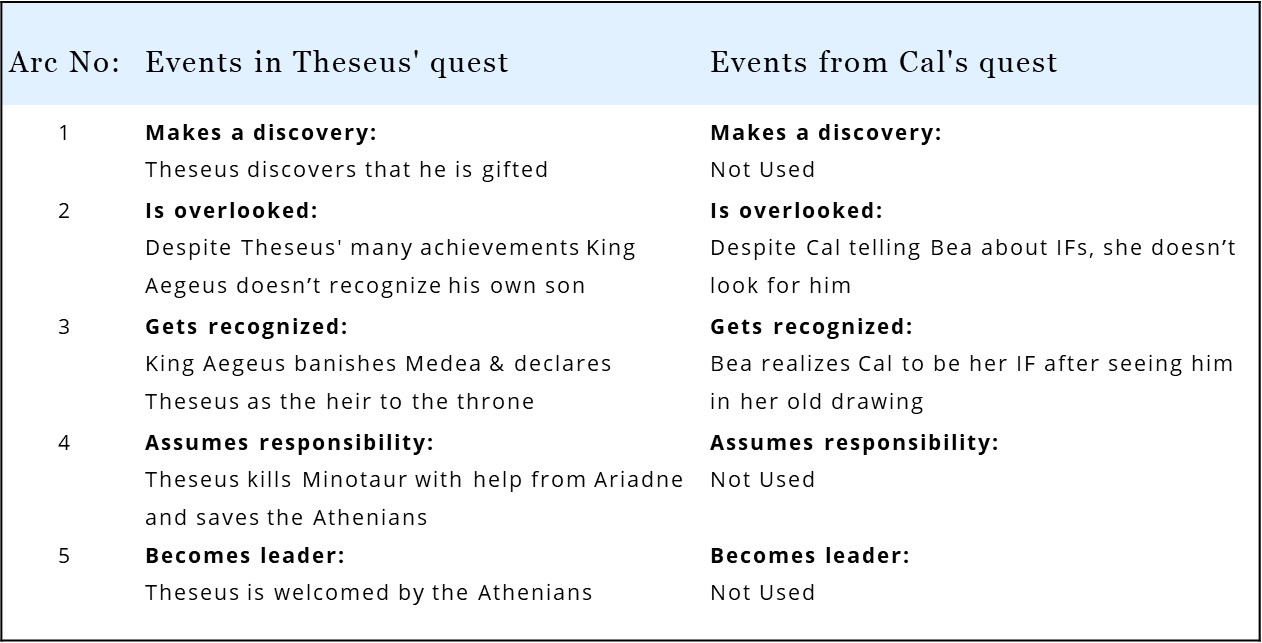Twisters left a lot on the table

-
Est vs Actual domestic box office revenue:
$58 - 83/$111MM - Ideal Plot structure reconstructed with 3 mythological tales increase revenues by ~7X
IF is written and directed by John Krasinski. The movie is about a girl who sets out to reunite grown-ups with their forgotten imaginary friends. It misses a huge opportunity in exploring the role of an imaginary friend who reunites the girl with her dad. The movie's plot structure is extracted with three mythological tales to estimate its box-office revenues and unlock the hidden potential.
1. Mythological tales reveal the invisible plot structure of any story
1A. 95% of the events are borrowed from 3 mythological tales
Bea’s quest mirrors the tale of Hanuman from Hindu mythology, where both are driven by the desire to serve a clan or order. Hanuman devotes his life to help Ram find Sita. Bea helps IFs reunite with the kids who have forgotten them.
Blue’s quest mirrors the tale of Karn from Hindu mythology, where both are driven by the desire for acceptance. Karn wants to be accepted as a warrior. Blue wants to be accepted as an imaginary friend. Blossom mirrors the same quest, with lesser events.
Every human desire has two quests - a fulfilled one and also an unfulfilled one. IF uses both quests for the desire of acceptance. Blue mirrors part of the unfulfilled quest whereas Cal mirrors the fulfilled quest.
Cal’s quest mirrors the tale of Theseus in Greek mythology, where both are driven by the desire for acceptance. King Aegeus fails to recognize his son, Theseus. Despite Cal telling Bea about IFs, she doesn’t look for her IF.
Bea’s dad has no quest.
Detailed mirroring of each character’s primary quest to their respective mythological tales is in section “3A. Quests of characters and their mythological counterparts”
Blue’s quest mirrors the tale of Karn from Hindu mythology, where both are driven by the desire for acceptance. Karn wants to be accepted as a warrior. Blue wants to be accepted as an imaginary friend. Blossom mirrors the same quest, with lesser events.
Every human desire has two quests - a fulfilled one and also an unfulfilled one. IF uses both quests for the desire of acceptance. Blue mirrors part of the unfulfilled quest whereas Cal mirrors the fulfilled quest.
Cal’s quest mirrors the tale of Theseus in Greek mythology, where both are driven by the desire for acceptance. King Aegeus fails to recognize his son, Theseus. Despite Cal telling Bea about IFs, she doesn’t look for her IF.
Bea’s dad has no quest.
Detailed mirroring of each character’s primary quest to their respective mythological tales is in section “3A. Quests of characters and their mythological counterparts”
1B. 32 mythological tales are the source of all stories, even the untold ones
Human beings are driven by 16 fundamental desires. Every desire, whether encountering fulfilment or unfulfillment, gives rise to two distinct quests. Thus, a spectrum of 32 unique quests mirrors every human desire.
We have discovered mythological tales from across civilizations that uniquely portray each one of these 32 human quests. While each mythological tale stands as a distinct quest, the true magic unfolds when these tales are combined. This synergy is evident in the epics of Odyssey and Ramayan, where various universal quests seamlessly intertwine.
Combining any five tales from the 32, generates a staggering 24 million unique story plots. Take it a step further, by combining six tales the possibilities explode to an astounding 600 million!
The unique plot structure of Twisters is # 8,495. It emerges from interweaving the tales of Hanuman, Karn & Theseus.
We have discovered mythological tales from across civilizations that uniquely portray each one of these 32 human quests. While each mythological tale stands as a distinct quest, the true magic unfolds when these tales are combined. This synergy is evident in the epics of Odyssey and Ramayan, where various universal quests seamlessly intertwine.
Combining any five tales from the 32, generates a staggering 24 million unique story plots. Take it a step further, by combining six tales the possibilities explode to an astounding 600 million!
The unique plot structure of Twisters is # 8,495. It emerges from interweaving the tales of Hanuman, Karn & Theseus.
2. Plot structure potential of IF: $58-83MM
2A. Plot structure evaluation
An analysis of Blockbuster, Hit & Flop plots has led to the discovery of Mythosis Code. The Code reveals the story principles shared by all Blockbusters. We use the Code to estimate a story’s potential.
- All Blockbusters have at least 3 universal quests. IF uses 3 universal quests of Honour, and the fulfilled/unfulfilled quests of Acceptance.
- In Blockbusters, each universal quest is mirrored by ONLY ONE character. Bea mirrors the quest of Honour. Blue & Cal mirror the two universal quests of Acceptance.
- Every Blockbuster character borrows at least 35% of the universal quest. Bea borrows 32% of the events from Hanuman’s quest. Blue borrows 16% of the events from Karn’s quest. Cal borrows 13% of the events from Theseus’ quest.
- Blockbusters interweave different quests to create a tight plot structure. Interweaving occurs when events of 2 quests occur simultaneously in the story. Blockbusters have a quest interweaving threshold of 0.5. The quest interweaving score of IF is 0.33 and is below par. Here is an example of interweaving the quests of Bea & Blue:

2B. Estimating revenue potential from the plot structure
In IF's plot structure, none of the quests have sufficient depth which also impacts the interweaving which is below par. As a result, the plot is a disjointed sequence of events and the characters lack complexity.
We have created an algorithm by assigning weights to the principles of The Mythosis Code. The algorithm calculates the potency of a story’s plot structure and estimates its corresponding audience appeal. Blockbuster plot structures have a score of at least 0.64 and appeal to 20% of the audiences.
IF’s plot structure has a score of 0.05. IF will appeal to 1.32% - 1.62% of the population. Our estimate of the movie’s revenues from its audience appeal is $58 – 83MM in the domestic market.
We have created an algorithm by assigning weights to the principles of The Mythosis Code. The algorithm calculates the potency of a story’s plot structure and estimates its corresponding audience appeal. Blockbuster plot structures have a score of at least 0.64 and appeal to 20% of the audiences.
IF’s plot structure has a score of 0.05. IF will appeal to 1.32% - 1.62% of the population. Our estimate of the movie’s revenues from its audience appeal is $58 – 83MM in the domestic market.
3. The ideal plot structure of IF
We have identified 32 universal quests that represent every human desire. These quests are the superset of thousands of stories across cultures that reflect our collective subconscious. Each quest has a structured sequence of events divided into 5 major arcs.
We map a character’s quest to the relevant mythological tale (universal quest) which reveals the gaps in their quest, if any. The ideal Plot Structure is constructed by plugging these gaps with the missing events from the tale. These events strengthen both the journey of characters as well as the weaving of quests without altering the story.
We map a character’s quest to the relevant mythological tale (universal quest) which reveals the gaps in their quest, if any. The ideal Plot Structure is constructed by plugging these gaps with the missing events from the tale. These events strengthen both the journey of characters as well as the weaving of quests without altering the story.
3A. Quest of characters and their mythological counterparts
Quest 1: Bea mirrors the universal quest for Honour
Bea’s desire for Honour stems from the need to serve a clan or order. The tale of Hanuman from Hindu mythology is the universal quest for Honour.

Quest 2: Blue mirrors the universal unfulfilled quest for Acceptance
Blue’s desire for Acceptance stems from the need for approval from others. The tale of Karn from Hindu mythology is the universal unfulfilled quest for Acceptance.

Quest 3: Cal mirrors the universal fulfilled quest for Acceptance
Cal’s desire for Acceptance stems from the need for approval from others. The tale of Theseus from Greek mythology is the universal fulfilled quest for Acceptance.

3B. Gaps in the current plot structure
There are two major gaps in the current plot structure.
1. Every character quest is shallow
2. Cal’s quest is not interwoven with any of the characters.
1. Every character quest is shallow
2. Cal’s quest is not interwoven with any of the characters.
3C. Unlocking the hidden potential
The ideal plot structure redrafts the story with the character quests of Bea, Cal, Blue and assigns a quest to Bea’s dad.
Cal’s quest is the weakest and has the maximum possibility of being strengthened. Borrowing additional events not only strengthens the quest but also ensures interweaving with other quests.
Assigning a quest of Tranquillity for the broken-hearted Bea’s dad builds a compelling father daughter relationship. Moreover, it creates an opportunity for Cal to help Bea save her dad.
The plot structure interweaves the universal quests of Honour, Acceptance and Tranquillity.
Cal’s quest is the weakest and has the maximum possibility of being strengthened. Borrowing additional events not only strengthens the quest but also ensures interweaving with other quests.
Assigning a quest of Tranquillity for the broken-hearted Bea’s dad builds a compelling father daughter relationship. Moreover, it creates an opportunity for Cal to help Bea save her dad.
The plot structure interweaves the universal quests of Honour, Acceptance and Tranquillity.
- Tags: 2024, Acceptance, Character Arcs, Hanuman, Honour, John Krasinski, Karn, Long range prediction, Mythology, Paramount Pictures, Screenwriting, Story plot, storytelling, Theseus
